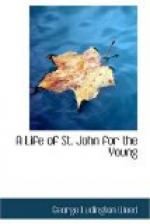“Bow down before thy King,
My soul!
Earth’s kings, before Him bow ye down;
Before Him monarchs humbly roll,—
Height, might, and splendor, throne and crown.
He in the mystic Land divine
The sceptre wields with valiant hand.
In vain dark, evil powers combine,—
He, victor, rules the better Land.”
—Ingleman.—Trans.
Hymns of Denmark.
“It is probable that St. John attended Christ through all the weary stages of His double trial—before the ecclesiastical and the civil authorities—and that, after a night thus spent, he accompanied the procession in the forenoon to the place of execution, and witnessed everything that followed.”—Stalker.
We know not what became of nine of the disciples fleeing from Gethsemane; whether they first hid among the bushes and olive-trees, and escaped into the country; or took refuge in the neighboring tombs; or stole their way to some secret room where the goodman of the house furnished them protection; or scattered in terror each in his lonely way.
The captive Lord was dragged along the highway where Peter and John had been for a single hour the Heralds of the King. Over the Kidron, up the slope of Moriah, through the gate near the sacred Temple, along the streets of the Holy City, He was led as a robber to the high-priestly palace.
Three Evangelists tell us, “Peter followed afar off.” But love soon overcame his fears. He was not long alone. John says, “Simon Peter followed Jesus and so did another disciple.” We cannot doubt who was Peter’s companion as he turned from his flight. They “went both together,” as two days later they ran on another errand. In the shadows of the olive-trees along the roadside, or of the houses of the city, they followed the hurrying band which they overtook by the time it reached the palace gate. John did not “outrun Peter,” who was probably the leader. But at the gate they were separated.
We must not think that this palace was like an American house. The entrance to it was through a great arched gateway. This was closed with a large door or gate, in which there was a small entrance called a wicket gate, through which people passed. These gates opened into a broad passage or square court. Around it on three sides the house was built. All rooms upstairs and down looked into it. One large room, forming one side, was separated from it, not by a wall, but by a row of pillars. Being thus opened it was easy to see what was passing in the room or the court.
“That disciple,” who accompanied Peter to the gate, “was known unto the high priest and entered in with Jesus into the court of the high priest. But Peter was standing at the door without.” John was doubtless familiar with the place and the servants, and went in with the crowd. He kept as near as he could to his Master during the dark hours of His trial, as he was to do during the yet darker hours at the cross.




